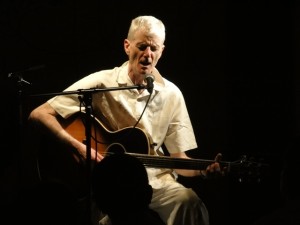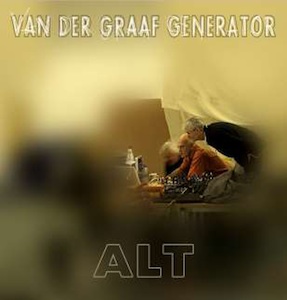Riffs, Rants and Rumors: Peter Hammill Plays Truth or Consequences
posted in: Features • Rock
 What the hell is a Van der Graaf Generator anyway? That’s the question a lot of people were probably asking back in 1969, when the first album by a young British band of that name appeared. In fact, a Van de Graaff generator (note spelling) is a device that creates electrostatic energy, but the group named after that machine generated an electricity all their own. By the early ˜70s, after releasing such cult-classic records as He To He, Who Am The Only One, and Pawn Hearts, Van der Graaf Generator had established a musical reputation as the Richard III of U.K. prog-rock bands, reveling in the dark underbelly of the human condition and casting a crooked half-smile upon creation as something slightly sinister simmered in the background.
What the hell is a Van der Graaf Generator anyway? That’s the question a lot of people were probably asking back in 1969, when the first album by a young British band of that name appeared. In fact, a Van de Graaff generator (note spelling) is a device that creates electrostatic energy, but the group named after that machine generated an electricity all their own. By the early ˜70s, after releasing such cult-classic records as He To He, Who Am The Only One, and Pawn Hearts, Van der Graaf Generator had established a musical reputation as the Richard III of U.K. prog-rock bands, reveling in the dark underbelly of the human condition and casting a crooked half-smile upon creation as something slightly sinister simmered in the background.
While the initial incarnation of the band fell apart in 1978, Van der Graaf returned to active duty in 2005 with Present, as a trio featuring original members Peter Hammill, Hugh Banton, and Guy Evans. Incredibly, the 21st century version of the group turned out to be just as vital-sounding as the original ensemble, and they’ve recorded four albums together so far, with the fourth, ALT, out on July 3. Prolific VDGG frontman Hammill also just released a new solo album, Consequences (he’s maintained an active solo career since the early ˜70s), and he’s currently busy touring America with his Van der Graaf bandmates.

The new band album is kind of an unusual one because it’s kind of improv, says Hammill. I know a lot of Van der Graaf is pretty out there, but this is out there even by Van der Graaf standards. That’s coming out more or less simultaneously with the tour, but on the tour we’ll be doing comparatively normal songs. On the new album¦it’s all instrumental for a start, which is not normal for Van Der Graaf, but basically it’s stuff that built up since 2005. Every time we got together for a rehearsal period or for a recording period, there would always be some element of improvisation that was recorded. We’ve got a long track record individually and collectively of doing things that are not really in any rock area, they’re more sort of musique concrete sounds, so that’s more or less what this new record, ALT, is about. Basically, the material built up over a period of years until it reached a kind of critical mass and we went, Okay, actually, this is not our usual stuff, but it’s also part of our story and our history, so now is the right time to put it out.
Part of what has helped make both Van der Graaf Generator and Hammill’s solo output so unique, from the earliest efforts to tracks like Mathematics from 2011’s appropriately titled A Grounding in Numbers, is the songwriter’s penchant for incorporating language and concepts from the scientific/mathematical sphere”not exactly standard procedure even in the heady world of prog-rock lyricism. It’s a natural language for me, Hammill explains, That was what my original education was headed towards. In fact, when I got to university level”which I did flunk out of, I have to say, rather than going through”the professor of my course was aware that it was time that science start explaining itself to society and vice versa. That’s obviously now a completely normal concept, because there are science supplements in every newspaper. Everyone has some idea what’s going on with science, as opposed to the attitude back then, which was very much Leave it to the men in white coats. I came out of that. In my view a lot can be taken from the way we currently understand the workings of the planet and the universe, our understanding of our own workings¦perhaps at the same time we’re losing this idea of an anthropomorphic God. It’s not a tradeoff in terms of religious stuff, but there is a lot of scientific and mathematical stuff from which we can take a measure of parallel feeling about our own lives. We’re into a world of unimaginable ˜What if?’ in modern physics, which is marvelous!

While Hammill describes himself as not that fantastically well read, he allows that there’s a particular wing of literary history that also influenced his writing early on. I was very keen on Icelandic and Viking sagas in my youth going on my teenage years, he reveals, and they have a very interesting way of wielding words that I think at different times has worked itself into my structure. Njal’s Saga, it’s the great one in Iceland; as in the case of most of the sagas, it revolves around lots of revenge and lots of bloodshed, to be honest, but with a beauty of language, because of course these were basically stories that were told, the oral history of people. I must have come across this I guess when I was 15, something like that. That’s how you end up with your own story, really, accidents that produce your matrix. But Hammill also cites an early interest in science fiction writers Frank Herbert and Phillip K. Dick, adding, Lately actually, J.G. Ballard has come up again into the frame.
A key artistic idée fixe of Hammill’s over the years seems to be the systematic subversion of relatively straightforward musical and lyrical elements, building a bigger beast by knocking the original off its axis. Oddly, that’s exactly what my wife says as well, he admits. ˜You start with something sweet and then you fuck it up.’ From a normal point of view that might be true, but actually it’s the cocking it up that makes it interesting for me. I don’t like choruses that are the same each time, I like for there to be a change in the course of a song, lyrically and musically, it’s just what interests me. But it does make sense to me, it’s not a process where I’m trying to be clever or willfully obtuse, I’m trying to get the thing to make sense with the way I see things, which is actually slightly wonky. It’s instinctive.

During the band’s first lifetime, in the ˜60s and ˜70s, there was a doomy, apocalyptic aspect to much of the material, and often a feeling of inner demons being exorcised. Particularly on the early Van der Graaf records, agrees Hammill, we weren’t invoking dark magic or trying to do spells, but it started as wanting to make scary music, yeah. In my solo stuff, as with the Van der Graaf stuff, the things that interest me most in writing are these edgy moments”moments of uncertainty, moments of doubt. In a way, it’s become less dramatic than it used to be back in the days of youth. These days it’s kind of the sneaking worries about things as opposed to the kind of Sturm und Drang that obviously goes on when you’re in your late teens and early 20s. I’m not against music that’s simple and joyous, but for whatever it’s worth I think the unique aspect of the Van Der Graaf voice and my solo voice has been that slightly darker area. In a way there’s an element of cathartic process in this for me, and as a result of facing these things, these problems, I’ve been, in a way, able to go off and live the rest of my life in a more joyous fashion. Perhaps¦by facing up to things, through our art or anybody else’s art, the audience can likewise go on, and go, Okay, this stuff exists, now let’s get on with the other stuff.
Nevertheless, the current incarnation of Van der Graaf seems to have supplanted those dramatic dystopian touches with a comparatively sanguine approach that bespeaks an inevitable artistic maturity. A key example is the hymnlike, downright inspirational tune Your Time Starts Now from A Grounding in Numbers. It’s sort of a statement of intent of the trio’s attitude, says Hammill of the song. ‘Yeah, we are 60-year-old guys who’ve done a certain amount of work over the years, but here we are now.’ And whatever we’ve done in the past, it exists, but in the past, and effectively one has to get on with dealing with what is now, or else you’re not doing a proper job. The closing line of the song, it is a particularly kind of Zen hymn I think, it’s neither triumphant nor regretful, it’s saying, ˜Just go on, just go further.’ Because you don’t know what’s going to be coming next, but you have to try and approach it honestly.
With a solo discography that includes dozens of albums full of intense, articulate art-rock statements, and a legacy with Van der Graaf Generator that puts the group in the pantheon of the great first-generation prog bands, 63-year-old Hammill has a huge amount of work behind him. But he remains as compelled as ever to keep pushing forward, and challenging both himself and his bandmates at each step of the journey. At the end of the day, what does he hope audiences will come away with after absorbing his music? With a sense of celebration of the fact that we are alive, he muses, complicated though it is at times, but one must try to be positive and go forward, and in that there is joy.”
